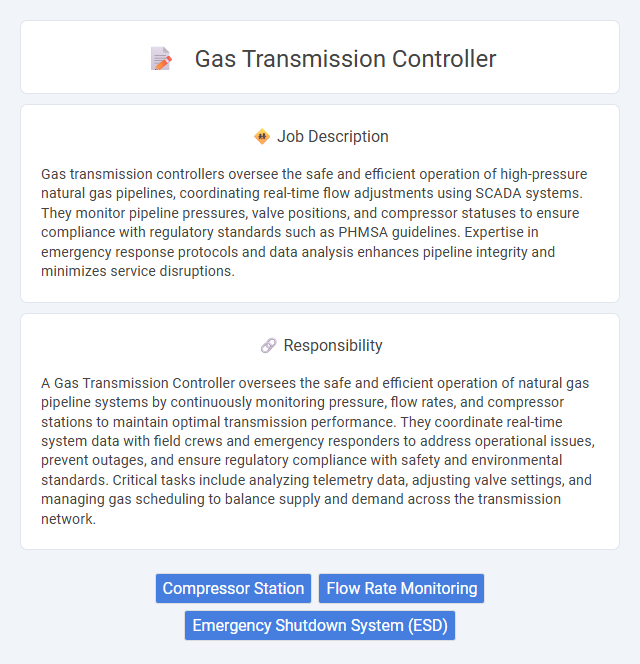
Gas transmission controllers oversee the safe and efficient operation of high-pressure natural gas pipelines, coordinating real-time flow adjustments using SCADA systems. They monitor pipeline pressures, valve positions, and compressor statuses to ensure compliance with regulatory standards such as PHMSA guidelines. Expertise in emergency response protocols and data analysis enhances pipeline integrity and minimizes service disruptions.
Individuals with strong analytical skills and the ability to remain calm under pressure are likely well-suited for a gas transmission controller role. Those comfortable working in high-stakes environments where quick decision-making is essential may find this job aligns with their strengths. People who struggle with stress or lack attention to detail might face challenges in performing effectively in this position.
Qualification
A Gas Transmission Controller requires a strong background in pipeline operations, typically holding a degree in engineering or a related technical field. Expertise in SCADA systems, real-time monitoring, and emergency response protocols is essential for managing the safe and efficient flow of natural gas through transmission networks. Certifications such as Certified Control Systems Technician (CCST) or relevant industry safety training enhance qualification and operational readiness.
Responsibility
A Gas Transmission Controller oversees the safe and efficient operation of natural gas pipeline systems by continuously monitoring pressure, flow rates, and compressor stations to maintain optimal transmission performance. They coordinate real-time system data with field crews and emergency responders to address operational issues, prevent outages, and ensure regulatory compliance with safety and environmental standards. Critical tasks include analyzing telemetry data, adjusting valve settings, and managing gas scheduling to balance supply and demand across the transmission network.
Benefit
A gas transmission controller likely provides critical benefits such as ensuring the safe and efficient flow of natural gas through pipelines, minimizing the risk of leaks or disruptions. They probably enhance operational reliability by closely monitoring system pressures and adjusting controls in real-time to prevent outages. Their role may also contribute to cost savings by optimizing fuel usage and reducing the likelihood of expensive emergency repairs.
Challenge
The Gas Transmission Controller role likely involves managing complex pipeline systems, presenting constant challenges in maintaining safe and efficient gas flow amid fluctuating demand and supply conditions. High-pressure decision-making and real-time problem-solving are probably critical due to the potential safety risks and financial impacts associated with disruptions or errors. Navigating regulatory compliance and coordinating with multiple teams might further complicate operational challenges in this position.
Career Advancement
Gas transmission controller roles offer critical opportunities for career advancement through gaining expertise in pipeline operations, safety protocols, and real-time system monitoring. Progression typically involves moving into senior controller positions or transitioning to supervisory roles overseeing operational teams and strategic planning. Developing skills in SCADA systems, regulatory compliance, and emergency response enhances prospects for leadership roles within energy companies.
Key Terms
Compressor Station
A Gas Transmission Controller manages the real-time operations of compressor stations, ensuring optimal pressure and flow rates to maintain pipeline integrity and meet demand. They monitor compressor performance, coordinate start-up and shutdown procedures, and troubleshoot operational issues to prevent service interruptions. Expertise in SCADA systems and compliance with safety regulations is essential for efficient gas transmission control.
Flow Rate Monitoring
Gas transmission controllers specialize in monitoring and managing flow rates within high-pressure pipeline systems to ensure efficient and safe gas delivery. They utilize advanced SCADA systems and pressure sensors to continuously track real-time flow metrics, adjusting valve positions and compressor outputs to maintain optimal pipeline performance. Precise flow rate monitoring prevents pipeline failures, reduces energy consumption, and supports regulatory compliance in gas transmission operations.
Emergency Shutdown System (ESD)
A Gas Transmission Controller specializing in Emergency Shutdown Systems (ESD) is responsible for monitoring and managing automated safety protocols to prevent hazardous gas leaks and pipeline failures. They ensure real-time system integrity by overseeing ESD sensors, valves, and control software to initiate rapid shutdowns during emergencies, minimizing operational risks. Expertise in ESD enhances system reliability and regulatory compliance in high-pressure gas transmission environments.
 kuljobs.com
kuljobs.com